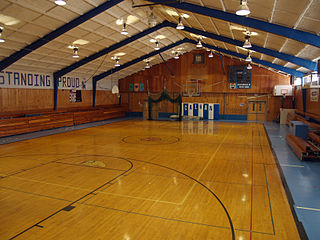This past week Hawaii’s New Hope Churches agreed to settle a lawsuit originally filed in March 2013 by citizen activists Mitchell Kahle and Holly Huber. The “qui tam whistle-blower” lawsuit argues that these New Hope churches misrepresented time spent renting public school facilities costing the school millions in lost revenue. In an August press release, the plaintiffs claim that there has in fact been “widespread abuse and outright fraud perpetrated by churches often with the explicit approval or knowledge of school principals and/or their designees.”

Honolulu
The New Hope Churches make up only 3 of the 5 original defendants. Along with New Hope, the Calvary Chapel of Central Oahu and One Love Ministries were also accused of falsifying records to avoid paying rental and utility fees. The plaintiffs estimate that New Hope Oahu alone owes 3.2 million for the rental of Farrington High School. In their press release, Kahle and Huber claim:
There is long‐standing and widespread abuse in the DOE’s “Community Use of School Facilities Program.” The abuse has cost taxpayers millions of dollars in lost revenue, and million‐dollar losses are continuing every year because of unpaid rental fees and utilities charges by literally hundreds of churches operating out of nearly as many public schools. [We] have called for the entire program to be audited, reformed and for all monies owing to be collected.
Following the August hearings, two of the churches fired back asking for the case to be dismissed. In October, the Alliance Defending Freedom on behalf of the Calvary Chapel of Oahu and One Love Ministries filed such a request arguing that “[The school system] was fully aware of the terms and conditions of use … That’s not fraud.” In December the court granted that request but also has allowed the plaintiffs 45 days to re-file their complaints. In response attorney Jim Bickerton said, “If you think about it, what has been the result here? We are just going to put more detail into the public record. How that advances the churches cause I’m not sure.”
Then Wednesday, Feb. 12, the Hope Churches announced that they would settle rather than undergo a costly legal battle. Through their parent company, the three churches will pay $775,000 of which $200,000 will go to plaintiffs Kahle and Huber for bringing the case to the courts. Despite the settlement, the churches never admitted to any fraudulent behavior.

Mitch Kahle
As an atheist activist, Kahle is no stranger to this type of legislative action. In 2010 he and a friend, Kevin Hughes, publicly protested the Hawaii State Senate’s practice of opening their session with religious prayer. Kahle’s short vocal protest, captured on video, led to his arrest. He was discharged but later filed a successful lawsuit against the state for abusive action. The state awarded him $100,000 in damages. Bickerton was his attorney in the case.
Because of his protest and a follow-up by the American Civil Liberties Union, Hawaii became the first state to ban prayer in its legislative body. Kahle went on to file several other related lawsuits; the results of which are unclear.
As suggested by past activities, Kahle’s interest in the current church situation is not the protection of children, the funding of education or the recuperation of tax payer dollars. He is solely interested in ejecting religion from the public sphere. Kahle said, “The state was subsidizing the churches for many, many years.” That amounts to church-sponsored religion.
The churches’ failure to pay the appropriate rental fees does not truly equate to a loss of taxpayer funds or subsidizing. The school buildings would sit empty otherwise costing money to maintain either way. Whether the churches committed fraud and whether the school board knew is an entirely different issue and up to the courts.
However Kahle raised a valid question. Is any of this legal? If so, should it be? Should churches or any religious institution be allowed to conduct services, collect money and preach their gospel on government school property? Does this practice violate the Constitution? If religious groups can rent public parks and other similar community facilities, why not schools? Are schools different?

Photo Courtesy of “Beyond My Ken” (Wikipedia CC License)
In 2012 the Supreme Court of the United States (SCOTUS) refused to hear a case that asked this very question. In Bronx Household of Faith v. Board of Education of the City of New York, a US Federal Appeals Court upheld a newly instated New York City School Board policy banning the rental of public school buildings to groups that “discriminate on the basis of race or religion.” The NYC School Board believes that this practice “improperly advances religion.” SCOTUS’ refused to hear the case leaving all regulation up to the municipalities. In 2013 over 60 New York City churches had to find new accommodations for their Sunday services.
Does a Sunday sermon in an empty school building “advance religion?” If the buildings are unused and only costing taxpayer money, why not rent them out to anyone willing to pay the fees? Often renting a school is cheaper and more convenient than renting a private facility. USA Today highlighted this topic in a 2010 article entitled, “Instant churches convert public schools to worship spaces.” The article points out that these “instant” churches rent the low cost space temporarily while collecting donations to be used toward the tax-free purchase of their own space. Is that simple economics or problematic loop-hole?

School Gymnasium Photo Courtesy of David Shankbone
Of course, there is one line that has yet to be crossed. What if the renting church was not Christian? Consider the words of Lifeway vice president Ed Stetzer,
So if a Wiccan coven wanted a use permit, you would have to be as neutral as you would with an evangelical church. … You would have no way to stop them.
Lifeway, a Christian resource company, is a supporter of school rentals. However as Stetzer points out, what’s good for Christian churches is good for everyone else. If schools do choose to rent the facility to religious organizations, they must rent uniformly. This Constitutional caveat clearly scares Lifeway’s Vice President.
Hawaii’s Department of Education, like many other school districts, makes it very clear that the possibility is real. Chapter 39 of its Administrate Rules states:
All public school buildings, facilities, and grounds shall be available for general recreational purposes and for public and community use whenever these activities do not interfere with the normal and usual activities of the school and its pupils as provided by law. This general rule shall be carried out within the policy of the department of education that no available public school building, facility or grounds shall be denied for use by the public and community on the grounds of race, color, religion, sex, age, national origin or disability.
Stetzer is correct. There would be no way to stop a Pagan or Heathen group from renting a school facility in order to host a religious ritual or class over a weekend.
In general these rental practices are supported legally through Board policy across the country. Money earned defers the cost of maintaining a large, expensive facility. Regardless we must return to the original question posed by Kahle’s activism and the NYC case. Does this activity amount to the government sponsorship of religion, whether that religion is Pagan, Heathen, Jewish, Hindu or Christian? Does renting the school grounds to churches of any faith “advance religion?” If not, where and how should the lines be drawn and who should be monitoring the practice?
The Wild Hunt is not responsible for links to external content.
To join a conversation on this post:
Visit our The Wild Hunt subreddit! Point your favorite browser to https://www.reddit.com/r/The_Wild_Hunt_News/, then click “JOIN”. Make sure to click the bell, too, to be notified of new articles posted to our subreddit.
It’s not limited to the USA; in Ontario the same such scenario also exists. Assuming the paperwork has been processed and any relevant documents (CPR/First aid, liability insurance, etc.) are in place, the community use of schools program allows almost anybody to apply to use empty space in the schools after hours for a nominal fee. In principle, I’m not opposed to this, but in practice this has meant that a regional church has set up after-school bible camp inside the school and begins operating as soon as classes let out, meaning in effect it is a quasi-government endorsed religious daycare. In principle, these groups are limited to advertising their services to their own existing members and putting flyers on a community board near the front entrance, but in practice this has resulted in the school secretaries putting advertisements for their after-school bible camp in my daughter’s take-home bag and teachers becoming spokespeople to promote this proselytization campaign inside the classrooms. The wife and I made a complaint about it, but the officials we spoke with didn’t see it our way.
Perhaps if you brought a lawyer into the conversation with your next complaint, the officials might get the point. At least that’s the advice I’d give a fellow Statesider; I don’t know just what the law is in Canada.
It’s similar to the US, but as much as my wife and I were angry with the school for subsidizing this church’s bible school group, we just don’t have the time or the money to bring an attorney into the discussion. There haven’t been any more fliers sent home in the kids’ take-home bags, but nothing else has changed. I get the impression that the church groups are counting on this, too: they’re funding these ventures with either through their congregations’ tithes, or else are being underwritten by a larger church-wide umbrella.
Even if several families pooled their resources, I think it would be very difficult for us to out-weigh an established church. The school administrator even remarked about the group, “Well, they’re already in five other schools in the district and we haven’t had any problems with them.” In her eyes, they pay their money and are the “good guys,” so our complaint comes across as us being cranks.
But then, state endorsement of religion in schools is nothing new to Ontario, one of the last provinces in Canada to continue the practice of government funded Catholic schools complete with elected Catholic officials to go along with their separate schools and funding.
The ability of schools to do this was secured sometime in the 1980s or ’90s by a Supreme Court decision, procured by the Christian Right, to the effect that if a public school supported any extracurricular activity (varsity sports, math club, etc) it could not bar religious activity. If a school barred one, it had to shut them all down.This was very useful as the ’90s wore on when student gay-straight alliances forced schools to accredit them or lose sports programs. (I was one of those holding the feet of the Oberlin OH principal to the fire on this.) Naturally the Christian Right objected, and found itself hoist by its own petard.
I wonder how they would react if you went to the school and told them you’d like to rent the school auditorium or gym for a Pagan festival.
A minor point. The buildings don’t sit empty either way. When there are activities the buildings need power for lighting and HVAC. The buildings need staff for cleanup or at least inspection. These are additional costs.
Leaving aside the question of if there should be public schools in the first place, I see nothing wrong provided all fees and expenses are paid and all religious groups have the opportunity to rent.
Of course that may put an end to it right there.
I’m lucky that my municipality makes it very hard to rent school space to anyone. If a group wants to rent they must have liability insurance for the building and participants and pay prevailing union wages for the custodian that must be there for a minimum of 5 hours. And the fees are high as well. However there is the community center (a converted school) that can be rented by any organization. I have rented space in it for Pagan Studies classes and years ago as the organizer for a New Age Church for its Psychic Fairs. Currently a fundamentalist Christian church utilizes a portion of the space. This is in addition to many other community and personal gatherings.
I have no problem with religious organizations renting government facilities if they can demonstrate that they are some benefit to the community.
Who decides what that benefit is or if it is beneficial? And which community, the community at large or their own community? I have no problem with religious organizations renting public space too, as long as it is equal. I have rented public space as I have stated above. The application didn’t ask the affiliation of the organization (religious, civic, fraternal or denomination). It just asked the size (# of people) and the time length requested. So in theory every group religious or non-religious are on equal footing in requesting space.